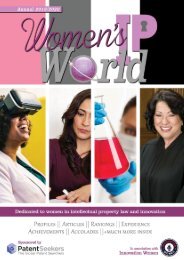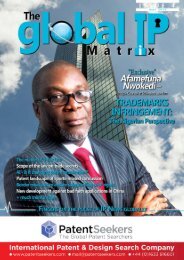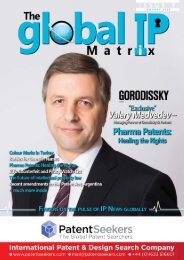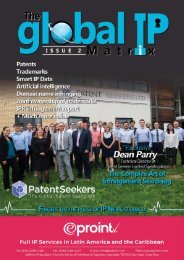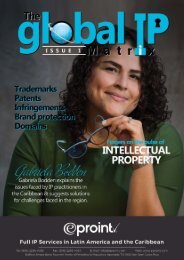Global IP Matrix - Issue 5
It has been a fantastic year for The Global IP Matrix magazine, thanks to all the efforts made by our contributors and to you, the reader for your continued support. We take great pleasure in putting together each issue of this publication, and we sincerely hope you enjoy this final issue of 2019. We have again, collaborated with some of the world's most influential IP law firms and businesses to bring you another eclectic mix of content, direct from the professionals working at ground level. We are already excited for the coming year and cannot wait to continue growing and evolving in our partnerships to bring you some exciting new features for 2020. Ms. Elvin Hassan Editor & Head of international liaisons
It has been a fantastic year for The Global IP Matrix magazine, thanks to all the efforts made by our contributors and to you, the reader for your continued support. We take great pleasure in putting together each issue of this publication, and we sincerely hope you enjoy this final issue of 2019. We have again, collaborated with some of the world's most influential IP law firms and businesses to bring you another eclectic mix of content, direct from the professionals working at ground level. We are already excited for the coming year and cannot wait to continue growing and evolving in our partnerships to bring you some exciting new features for 2020.
Ms. Elvin Hassan
Editor & Head of international liaisons
You also want an ePaper? Increase the reach of your titles
YUMPU automatically turns print PDFs into web optimized ePapers that Google loves.
Three<br />
Consonants<br />
A trademark application No 2016737523<br />
was filed by “Gazpromneft” JSC (a<br />
prominent Russian oil company) for the<br />
goods in Class 4 and services in Classes<br />
35, 37, 40, 41, 42.<br />
The trademark application included a<br />
figurative part and a word part – the letters<br />
GPN. The patent office agreed to register<br />
the trademark with the three letters being<br />
disclaimed. The patent office argued that the<br />
claimed designation contains a combination<br />
of three letters in the Latin alphabet. This is<br />
an abbreviation of the name of the company<br />
– GazPromNeft, which is a contraction of<br />
three words (Gaz (gas), Prom (industry),<br />
and Neft (oil). The patent office insisted that<br />
the abbreviation is not a word; it is made in<br />
standard font without any graphical features<br />
that could influence the positive perception<br />
of the designation by the consumer. Hence, it<br />
does not possess distinguishing capability. In<br />
its decision, the patent office relied on Article<br />
1483 of the Civil Code which sets forth that<br />
registration is not allowed if the designation<br />
does not possess distinctive capability. This is<br />
further explained in the Recommendations<br />
of the patent office for examiners. It is stated<br />
there that the combinations of letters which<br />
are not words are not registrable (an exception<br />
to this rule are designations which acquired<br />
distinctiveness over use, such as e.g., BMW).<br />
The applicant appealed the decision<br />
at the <strong>IP</strong> court. The <strong>IP</strong> court did not<br />
agree with the patent office, cancelled<br />
the decision, and sent it back for<br />
reconsideration.<br />
The patent office did not reconsider its decision<br />
but appealed the judgment of the <strong>IP</strong> court at<br />
its cassation instance. The cassation instance<br />
supported the judgment of the 1st instance<br />
court (Case No СИП-453/2018 judgment<br />
of March 25, 2019) and pointed out that the<br />
applicant had initially appealed the decision<br />
of the examiner at the Chamber of Patent<br />
Disputes and argued that the element “GPN”<br />
does possess distinctiveness however he failed<br />
in its attempt to prove it.<br />
When the decision was appealed at the <strong>IP</strong><br />
court, it was stated by the court that the patent<br />
office did not give credit to the evidence<br />
submitted by the applicant. The court pointed<br />
out that the patent office had not explained in<br />
its decision why it had declined a linguistic<br />
report of the expert and had not examined<br />
other evidence submitted by the applicant at<br />
the time of filing the trademark application<br />
or during the appeal procedure. The applicant<br />
did argue that the designation “GPN” has the<br />
properties of a word. Furthermore, a linguistic<br />
report confirmed this. The designation does<br />
have the basic characteristics of a word, and<br />
as such, it is a particular unit of the language.<br />
Conversely, the patent office argued that the<br />
claimed designation is an abbreviation used<br />
by the applicant on the market. This is not<br />
correct according to the <strong>IP</strong> court. The applicant<br />
argued that the word element “GPN” had been<br />
used for a long time and de facto became a<br />
trademark; it plays the role of the trademark<br />
in that it distinguishes his goods and services<br />
from those of other manufacturers.<br />
To support the arguments contained in the<br />
appeal, the appellant submitted sources of<br />
information as follow: a linguistic report,<br />
copies of contracts concerning supplies of oil,<br />
printouts from the Internet.<br />
The patent office declined the arguments<br />
contained in the appeal; it did not accept the<br />
assertion of the appellant that the combination<br />
of letters “GPN” had been used as part of the<br />
company names of several companies forming<br />
part of the Gazpromneft group. According to<br />
the patent office, that circumstance did not<br />
confirm the use of that designation for the<br />
purpose of individualisation of goods and<br />
services of the appellant because company<br />
names serve to identify legal persons but not<br />
the goods and services. The patent office stated<br />
that the appeal did not contain arguments<br />
confirming the famous character of the<br />
designation nor was there submitted evidence<br />
showing that the designation “GPN” acquired<br />
distinguishing capability as a result of its<br />
intensive use.<br />
The court of the first instance cancelled<br />
the decision of the patent office because in<br />
contravention of Article 1483(1) the patent<br />
office did not consider the expert report which<br />
opined that an abbreviation, regardless of the<br />
alphabet in which it is written, is a word.<br />
The patent office simply preferred not to<br />
notice the report.<br />
Besides, the court also pointed out that the<br />
patent office should have taken into account<br />
that the designation was used in the company<br />
26 www.gipmatrix.com<br />
By Vladimir Biriulin, Gorodissky & Partners<br />
www.gorodissky.com<br />
names of subsidiary companies and may be<br />
used in labor relations of the plaintiff. Thus, the<br />
court refuted the assertion of the patent office<br />
that the company name could not be used for<br />
individualisation of goods and services.<br />
Further, the court stated that the patent<br />
office had not duly evaluated the fact that<br />
the designation was used on documents<br />
confirming the manufacture of goods and<br />
rendering services by the plaintiff.<br />
The court also agreed with the plaintiff who<br />
referred to the international experience of<br />
use of company names in their abbreviated<br />
form, such as BMW, CNN, BBC, WWF, and<br />
others. Besides, the court did not agree that the<br />
designation consists of consonants only. When<br />
being read it would be pronounced as Gee, Pee,<br />
eN, i.e., the designation includes vowels as well<br />
as consonants.<br />
In conclusion…<br />
The patent office appealed the judgment at<br />
the <strong>IP</strong> court cassation instance; however,<br />
the Presidium of the <strong>IP</strong> court dismissed the<br />
complaint of the patent office. The court also<br />
made a statement that may not be pleasant<br />
for the patent office. It pointed out that the<br />
rules of registration of trademarks do not<br />
endow the patent office with the capacity to<br />
recognise its own conclusions as indisputable<br />
without analysis of the plaintiff ’s arguments.<br />
The Praesidium also concluded that not every<br />
combination of letters is an abbreviation, but<br />
an abbreviation is a word.<br />
As a result, the Praesidium of the <strong>IP</strong> court<br />
upheld the judgment of the 1st instance of<br />
the <strong>IP</strong> court and dismissed the patent office’s<br />
complaint.








